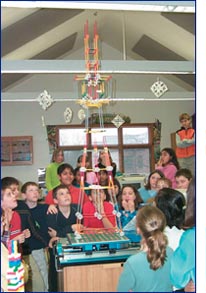

| • Kareem Receives
Cermack Award • Students Drive Engineering Outreach Projects |
|
 |
Kareem Receives
Cermak Award “For his long-term leadership in wind engineering and industrial aerodynamics applications to structural systems,” Ahsan Kareem, Robert Moran Professor and Chair of the Department of Civil Engineering and Geological Sciences, has been named the recipient of the 2002 Jack E. Cermak Medal. Bestowed annually on one individual for outstanding contributions to research or practice in wind engineering, the Cermak Award was established by the Engineering Mechanics Division of the American Society of Civil Engineers (ASCE) and the Structural Engineering Institute to recognize Jack E. Cermak’s lifetime of achievements in wind engineering and industrial aerodynamics. It will be presented to Kareem at the ASCE Annual Convention in November. A leading researcher in probabilistic structural dynamics, fluid-structure interactions, structural safety, and the mitigation of natural hazards, Kareem has been a member of the Notre Dame faculty since 1990. |
 |
Students Drive Engineering
Outreach Projects According to its 2001-02 annual report, one of the goals of the student chapter of the Earthquake Engineering Research Institute at Notre Dame (EERI@UND) is to “provide the next generation of practicing engineers with a venue to discuss the latest developments in the areas of earthquake engineering and to better prepare them for the challenges which will await them in their careers.” Tracy Kijewski-Correa, president of the student chapter, emphasizes that the graduate and undergraduate students of Notre Dame’s EERI hope to make a difference in the lives of area youngsters through two specific and very special outreach programs: Shakes & Quakes and Ms. Wizard Day. The Shakes & Quakes program is designed to help elementary and middle school students grasp the ways in which structures such as buildings and bridges respond to earthquakes. Often used as a supplement to textbook units, the program runs for approximately three weeks. The first week EERI@UND members visit a classroom they discuss the damage earthquakes cause and the importance of understanding how structures respond. They describe concepts such as energy dissipation and base isolation and highlight new life-saving technologies.  Then, they divide the class into groups of four students. Each of the
groups of youngsters is asked to build an “earthquake-proof” building
out of Lego® blocks and K’nex® pieces, using a project
handout and guidelines developed by EERI@UND. For example, one person
plays the owner of the building, one is the architect, one is the engineer,
and the fourth is the builder. Each is responsible for specific aspects
of the project, including the cost, strength, appearance, and constructability
of the structure. Then, they divide the class into groups of four students. Each of the
groups of youngsters is asked to build an “earthquake-proof” building
out of Lego® blocks and K’nex® pieces, using a project
handout and guidelines developed by EERI@UND. For example, one person
plays the owner of the building, one is the architect, one is the engineer,
and the fourth is the builder. Each is responsible for specific aspects
of the project, including the cost, strength, appearance, and constructability
of the structure.At the end of two weeks, EERI@UND members visit the class again to test the students’ buildings with a portable shaking table. In addition to testing their buildings, the student groups prepare presentations about their design, discussing the process and some of the obstacles they encountered as they worked together to meet the goals of the project. A one-hour adaptation of the Shakes & Quakes project has also been used for the Ms. Wizard Day program, an annual career fair targeting fourth to sixth-grade girls. Held on campus, Ms. Wizard Day helps girls “take the mystery out of math and science.” Participants spend the day engaged in a variety of hands-on activities that encourage teamwork while introducing them to engineering, science, and math concepts. The 2002 Ms. Wizard Day was sponsored by the University’s colleges of engineering, science, and business, along with Honeywell, Inc. Approximately 75 girls from several area schools attended. For more information on the student chapter of the Earthquake Engineering Research Institute at Notre Dame, visit http://www.nd.edu/~eeriund. [back to top] |